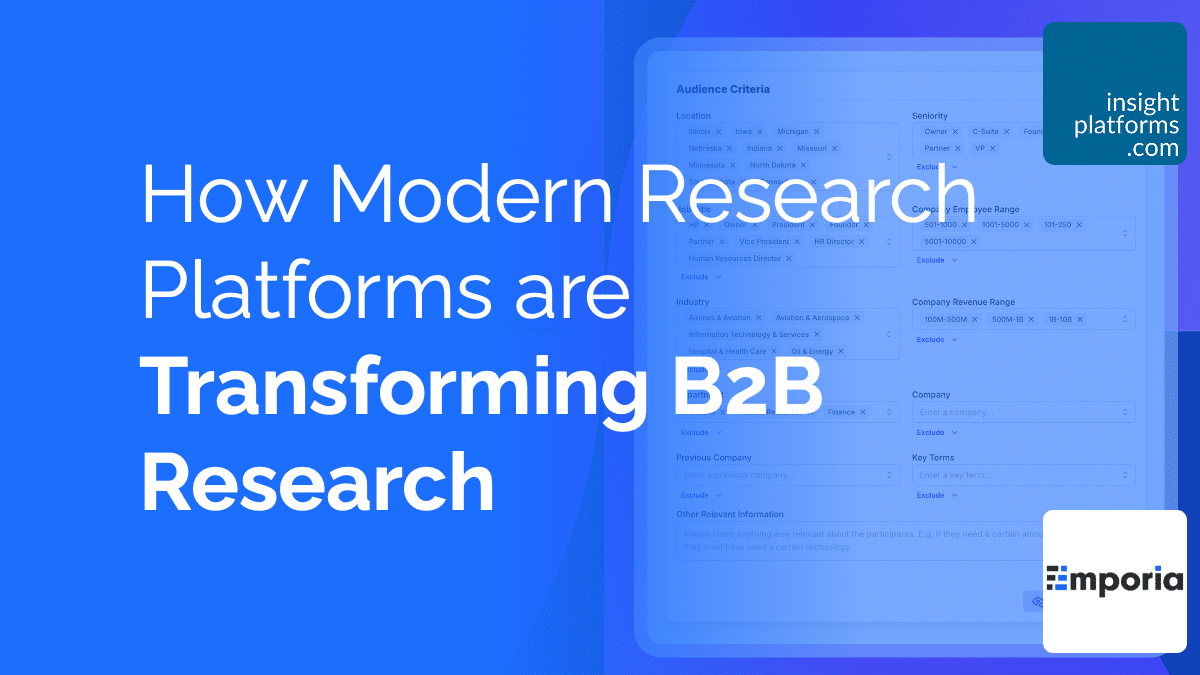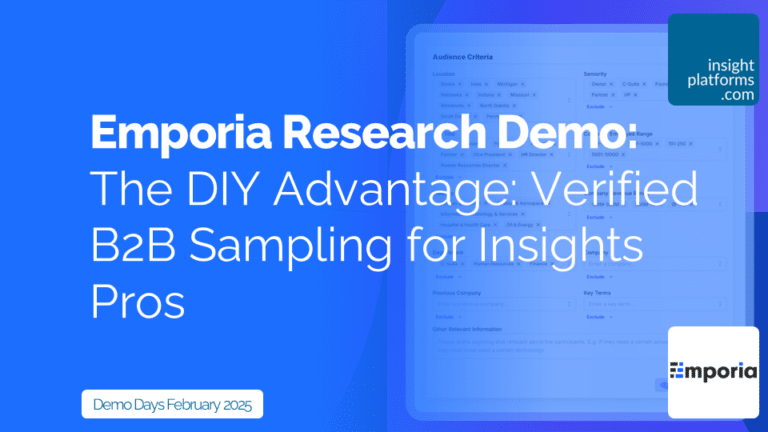
How Modern Research Platforms are Transforming B2B Research
- article
- B2B Research
- Social Media Recruitment
- Participant Recruitment
- DIY Sample
This article is a brief summary of Emporia Research’s Demo Days session in February 2025.
Watch the full webinar replay here:
Emporia Research Demo: The DIY Advantage: Verified B2B Sampling for Insights Pros
B2B market research no longer relies solely on cold calling and manual recruitment. Modern platforms are leveraging technology and professional networks to streamline the process of reaching business decision-makers. This piece examines the Emporia Research platform and its approach to B2B research participant recruitment and management.
Stay up to date
Subscribe to receive the Research Tools Radar and essential email updates from Insight Platforms.
Your email subscriptions are subject to the Insight Platforms Site Terms and Privacy Policy.
Emporia Research operates on a database of 800 million professional and firmographic records. The platform’s architecture centers on LinkedIn verification, requiring all participants to authenticate through their LinkedIn profiles, with additional security measures including minimum connection requirements and account age verification to prevent fraudulent participation.
About the Platform
The platform supports three main research methodologies: surveys, interviews, and activities. Researchers can utilize advanced filtering options to target participants based on specific criteria including job titles, company size, industry, location, and seniority level. Before committing to engage, users can preview potential participants who match their criteria to ensure alignment with study requirements.
For qualitative research, the platform includes an integrated scheduling system and screener survey builder with skip logic capabilities. Compensation is calculated based on fair market value, using salary data from sources like Glassdoor to determine appropriate incentives.
In terms of geographical reach, the platform operates globally but maintains its primary focus on English-speaking markets. Currently, recruitment is not supported in China, Russia, North Korea and Saudi Arabia. While the platform can work with non-English speaking professionals, its optimal functionality is with English-language LinkedIn profiles.
The business model operates on a pay-per-completion basis rather than subscription fees, with users only paying for verified completions. The platform maintains a sub-5% reversal rate across quantitative studies, indicating strong data quality standards.
How Emporia is Changing the Landscape
Recent developments include the integration of AI tools to assist with project description writing and screener programming. Looking ahead, the platform is developing capabilities for B2B synthetic sampling, though maintaining that this will complement rather than replace traditional primary research.
A notable shift in Emporia’s use has been its transition from primarily qualitative research to 80% quantitative studies, mirroring broader industry trends.
For research operations, the platform offers both DIY and managed service approaches, allowing organizations to choose their level of involvement in the research process. Future developments include planned integration with client CRM systems, which could enable organizations to conduct research with their existing customer bases.
While Emporia works with multiple data providers, LinkedIn authentication serves as the cornerstone of their verification process. This approach has apparently received LinkedIn’s approval, particularly because it promotes LinkedIn’s OAuth product in competition with other login systems.
Panel building capabilities exist through project and audience cloning features, though this differs from traditional panel management systems. The platform is also working on expanding its language support beyond English to better serve global markets.
Platforms like Emporia are reshaping B2B research by improving participant verification and automating recruitment. These advancements help address long-standing challenges while preserving the role of human oversight in research methodologies.
These developments suggest a continuing trend toward more automated, verified, and efficient B2B research processes, while maintaining the importance of human oversight and traditional research methodologies. The integration of AI tools and synthetic sampling capabilities indicates that further evolution in this space is likely.
Watch the webinar to learn more about the Emporia Research platform.



